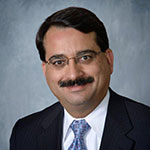It’s not uncommon for Os Mata to log 300,000 airline miles per year. He’s often in a hotel 20 nights per month. A recent trip took him from Chicago to Miami to Buenos Aires, Argentina to Lima, Peru to Bogotá, Colombia and back again. It took six flights, three nights on a plane, and two nights in a hotel.
In 2009, international business consulting firm Deloitte launched an Americas Cooperation Agreement (ACA) to increase cooperation and collaboration between all member firms in the Americas region and to take advantage of cross-country service and border opportunities. As a 26-year veteran and principal in the firm’s Americas consulting practice, Mata works to leverage Deloitte’s capabilities across the region, so the organization can operate seamlessly and better serve its clients’ complex needs. He expands market presence in the region, which includes the United States, Canada, Latin America, and the Caribbean. He’s doing so by rolling out standard methods, tools, industry-leading practices, and educational training programs in Latin America to nearly 3,000 consulting professionals with clients across the region.
The ACA benefits Deloitte clients with interests in numerous industries and geographies but also has advantages for the organization’s workforce. The agreement allows Deloitte to provide mobility for its professionals. Someone interested in international experience can easily move around the world as needed. If the firm needs to develop a solution or offering to benefit multiple countries, it can do so effectively, Mata explains. For example, as energy reform gains ground in Mexico, Deloitte can leverage its resources and deploy employees to support new opportunities that will be created for clients in the market.
The complexity of Latin American countries alone can be hard to grasp. “Our clients face the challenges of doing business across multiple countries. We help them find ways to get effective results,” Mata explains. It’s his job to understand local language and culture as well as the different regulatory, statutory, and tax requirements across the various economies. But the differences don’t end there—each country has varying levels of technology, human capital, and other business resources.
Although Mata has a history of accepting international assignments, his cross-cultural work has intensified in his role as Deloitte’s ACA leader in Latin America. It’s a part of the job he enjoys; by spending 80 percent of his time abroad, Mata is able to conduct the majority of his business in Spanish, his native language. There is, however, an art to understanding and managing the nuances between so many countries and cultures. Mata says the most valuable trait is adaptability. He’s also learned to be extremely disciplined in managing his professional and personal schedules.
Clients that ship across multiple countries, for example, may want Deloitte to help them find the appropriate tax structure or technology application for their distribution network. The organization’s sheer size gives it a competitive edge. “I like to believe that beyond our considerable bench strength, I’m no more than three phone calls away from finding an expert, so we can apply leading practices to the local context of any country and deliver results through people who know the language and culture,” says Mata.
If Deloitte is working with a mining company, for example, Mata’s teams can use predictive analytics to present a set of leading practices regarding an issue like environmental health. The organization takes industry-leading practices, couples them with resources, assigns those resources to a local project, finds people who know the specific culture, and develops systems to give the client a high-quality package of solutions while minimizing costs.
Mata is also involved in Deloitte’s diversity campaign. What started as an internal group designed to help people assimilate and share common experiences has turned into HNET, the company’s Hispanic employee networking group, also known as an employee resource group. Now, established members are leveraging their network to aid the community by giving back through local high schools and other organizations. Mata and other Hispanic professionals provide tax writing sessions, immigration advice, and other resources. They’re also collaborating with high schools and universities to develop programs that get students better positioned to enter the job market and land jobs with professional services firms.
Mata says his involvement in the group has been instrumental. “I’d encourage anyone to participate in a networking group,” he says because HNET gave him connections to people from many backgrounds and helped him develop skills to succeed globally. Now, as Mata works on the international stage, he’s using HNET to find and develop others who want to work in another country or develop their cross-cultural skills.

